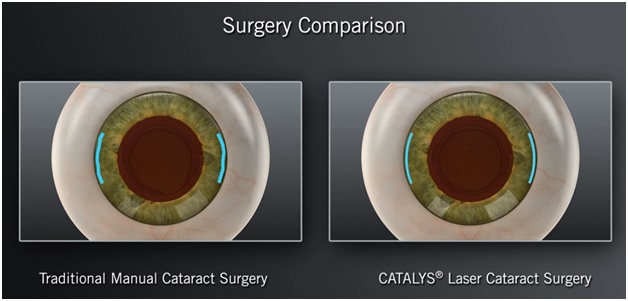Cataracts are one of the most common age-related eye conditions. They affect nearly half of all adults by the time they’re 75.
While cataracts are common in older adults, your risk of developing them increases once you’re forty or older. At first, you may barely notice if you have cataracts. But over time, they can hinder your vision and even lead to total blindness.
But the good news is that you can regain any vision lost due to having cataracts. There is only one form of effective treatment: cataract surgery.
But before talking about what cataract surgery is and who is a good candidate for it, you need to understand what cataracts are and how they can affect your vision. Keep reading to find out if vision loss due to cataracts is permanent!
How Cataracts Affect Your Vision

Cataracts form on the natural lens of the eye. They occur when the lens becomes cloudy.
Cataracts usually form as a result of the aging process. They develop when proteins on the lens begin to clump together. Over time, this makes the lens opaque, resulting in impaired vision.
Many people who have cataracts say it’s a lot like looking through a foggy or dirty window. The older you are, the more likely you are to develop cataracts.
Cataracts also tend to develop very slowly over time, much like other signs of aging. Because they develop so slowly, you may not realize you have them at first. But they can lead to a variety of visual symptoms, including:
- Blurry vision
- Light sensitivity
- Poor night vision
- Halos and glare
- Decreased ability to see contrast
Some of these symptoms may be confused for presbyopia. Presbyopia is another age-related condition that affects the eye’s lens.
Having presbyopia makes the lens less flexible, meaning it’s more challenging to focus on nearby objects. It’s essential to have your eyes examined regularly to have cataracts and other eye conditions diagnosed early.
That way, your eye doctor can monitor your vision as your cataracts develop. When the time is right, they may suggest getting cataract surgery. At some point in their lives, every person will need to get cataract surgery.
Cataract Surgery
Cataract surgery is the most commonly performed medical procedure in the country. It’s proven safe and highly effective.
Cataract surgery is the only way to remove cataracts, allowing you to see clearly once more. The procedure works by removing the natural lens.
The natural lens gets replaced with an artificial lens known as an intraocular lens (IOL). The IOL takes over the job that your natural lens could no longer perform.
There are many different IOLs available. Depending on the IOL your eye doctor recommends for you, you may be able to correct presbyopia and other vision concerns.
If you have cataracts, you may not need cataract surgery right away. Most cataract surgeons recommend having the procedure once cataracts stand in the way of daily activities.
If you can no longer do the things you love like hiking, driving at night, reading, or even basic tasks like cooking and cleaning because of your vision, it’s time to consider cataract surgery.
When to Have Cataract Surgery
Living with cataracts can be incredibly frustrating. With impaired vision, you may find it more challenging to leave the house to go to social events.
You may also find that you can injure yourself more due to falling. If you’re hurting yourself because you can’t see, it’s a sure sign that your quality of life is suffering.

Many people with advanced cataracts struggle to drive at night. Driving at night with cataracts can be downright dangerous between the glare from headlights, light sensitivity, and difficulty in seeing in low light.
If driving after dark is too difficult or unsafe, you should consider getting cataract surgery. Until you can have your cataracts removed, find a friend or family member that can drive you at night. Doing this will keep everyone on the road safer!
The longer you wait to have your cataracts removed, the more they’ll mature. As this occurs, your eyesight will only continue to worsen.
You may get to a point where you’re blind and can’t see anything at all. You can reverse vision loss from cataracts when you have cataract surgery.
Once you have cataract surgery, you’ll regain your autonomy and independence, making the most straightforward things easy again. Before having cataract surgery, you’ll meet with your surgeon for extensive testing and to discuss treatment options.
At Williamson Eye Center, we offer our patients a variety of options including extended depth of focus lenses to get patients great vision at near, intermediate, and far distances and options to be out of readers for almost all activities. Your ophthalmologist will recommend the best option for you, depending on your eye anatomy, lifestyle, and visual goals after cataract surgery.
Choosing a Treatment
Depending on your eye doctor’s recommendation, you may be a great candidate for a standard IOL or an advanced lens when you get cataract surgery. Monofocal IOLs are considered standard IOLs, and are the only lens most insurance plans will cover.
Choosing a premium advanced lens option requires paying out of pocket for a portion of the procedure. Many patients find the added price worth it (especially with great financing options), as lifestyle lenses can reduce or eliminate the need for reading glasses while providing you with much clearer vision.
Standard Cataract Surgery and Monofocal IOLs

In standard (or traditional) cataract surgery, the surgeon uses a scalpel to remove the cloudy lens and replaces it with a standard monofocal intraocular lens. In most cases with this method, glasses or contact lenses are still needed to correct vision.
Monofocal IOLs use a uniform lens that helps you see best at one focal point.
Advanced Cataract Surgery
With modern advanced technology, our surgeons are able to customize a treatment plan that is unique to your eye’s anatomy and your lifestyle.

At the Williamson Eye Center, we are pleased to offer a modern approach to your cataract surgery with:
- A Customized Treatment Plan
- Advanced 3D Imaging
- Laser Precise Treatments
- Gentle Approach to Surgery
- Less Inflammation
- Faster Recovery
- Astigmatism Correction
- Advanced Options to Greatly Reduce your need for Reading Glasses while also Correcting your Distance Vision
Laser Precision
During the first step of your laser cataract procedure, our surgeons use laser technology to create ultra-precise incisions that include a circular opening in the lens capsule to access and remove the cataract rather than the traditional method. This precise incision also helps your surgeon place your new intraocular lens exactly where intended for the best visual outcome.

To remove the hardened cataract from your eye, your surgeon will use the laser to soften the natural lens to remove it more gently than in traditional cataract surgery. This process requires less energy in the eye than traditional methods allowing for a faster recovery.
Advanced lenses offer a better range of vision at multiple focal points or an extended visual depth. Some of the lifestyle lenses we offer at Williamson Eye Center include the Light Adjustable Lens, the PanOptix trifocal lens, and the Tecnis Synergy and Symfony IOL, among others.
If you have astigmatism, laser treatment and a toric lens can help correct it during cataract surgery. Many advanced lenses come in toric options, allowing you to end up with the best possible vision!
Cataract surgery is only done once, so it’s important to consider your lifestyle and how you use your vision when deciding on your treatment options. You can not only restore your vision, but you may also be able to see better than you could even before you developed cataracts.
Do you need to have your cataracts removed? Schedule an evaluation at Williamson Eye Center in Baton Rouge, Denham Springs, Gonzales, New Roads, or Zachary, LA to learn more!



